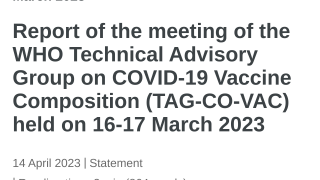Are You Vaccine Hesitant
As COVID-19 continues to 'wave' across the globe, policymakers worldwide are debating how to increase vaccine uptake and reduce hesitancy.
It is intuitively logical that frequent exposure to misinformation increases vaccine hesitancy.
A new study published today offers insights into COVID-19 vaccine data collected over three years that found that acceptance of COVID-19 vaccinations was 79.1% in 2022.
This is a 3.9% increase from 75.2% in 2021.
"The pandemic is not over, and authorities must urgently address vaccine hesitancy and resistance as part of their COVID-19 prevention and mitigation strategy," commented CUNY SPH Senior Scholar Jeffrey V. Lazarus in a press release on January 9, 2023.
"But to do so effectively, policymakers need solid data on vaccine hesitancy trends and drivers."
This study also reported on the receipt of therapeutics for COVID-19 and compared respondent preference for medicinal treatment versus prevention with vaccines.
Almost a quarter (24%) of those who became ill reported taking medications to combat COVID-19 symptoms.
These respondents reported using ivermectin as frequently as approved medications and products, despite the World Health Organization not recommending ivermectin.
This survey included about 23,000 respondents from 23 countries (Brazil, Canada, China, Ecuador, France, Germany, Ghana, India, Italy, Kenya, Mexico, Nigeria, Peru, Poland, Russia, Singapore, South Africa, South Korea, Spain, Sweden, Turkey, the United Kingdom, and the United States), surveyed from June 29 to July 10 2022.
However, vaccine hesitancy increased in eight countries, ranging from 1.0% (United Kingdom) to 21.1% (South Africa).
Almost 12.1% of vaccinated respondents are hesitant about booster doses.
Overall, support for vaccinating children under 18 increased slightly but declined among personally hesitant parents.
And support for vaccination mandates decreased in most countries.
These findings also corroborate previous literature showing greater hesitancy among those reporting concerns about vaccine safety and efficacy, low trust in government, and the perception that COVID-19 is a low risk.
Vaccination remains a cornerstone of the COVID-19 pandemic response, but broad public support remains elusive, wrote these researchers.
These data can be used by health system decision-makers, practitioners, advocates, and researchers to address COVID-19 vaccine hesitancy more effectively.
"Strategies to enhance vaccine acceptance should include messages emphasizing compassion over fear and using trusted messengers, particularly healthcare workers," added Lazarus.
Disclosures: This study has several limitations. Support for this study was from the City University of New York Graduate School of Public Health & Health Policy Research Foundation and institutional support from the Spanish Ministry of Science and Innovation. No industry conflicts of interest were disclosed.











_0.jpg)

.jpg)








.jpg)